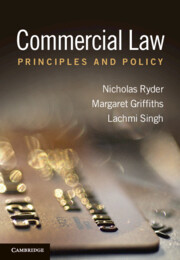Book contents
- Frontmatter
- Contents
- Preface
- List of abbreviations
- Table of Statutory Provisions
- Table of Cases
- Part 1 Agency
- Part 2 Sale of Goods and Services
- Part 3 International Trade and Sales
- Part 4 Tortious Liability for Defective Products
- Part 5 Unfair Commercial Practices
- Part 6 Banking and Finance Law
- Part 6 Chapter 1 Government Policy
- Part 6 Chapter 2 Banking and Finance Law
- Part 6 Chapter 3 Banking Regulation
- Part 7 Consumer Credit
- Bibliography
- Index
- References
Part 6 Chapter 3 - Banking Regulation
from Part 6 - Banking and Finance Law
Published online by Cambridge University Press: 05 August 2012
- Frontmatter
- Contents
- Preface
- List of abbreviations
- Table of Statutory Provisions
- Table of Cases
- Part 1 Agency
- Part 2 Sale of Goods and Services
- Part 3 International Trade and Sales
- Part 4 Tortious Liability for Defective Products
- Part 5 Unfair Commercial Practices
- Part 6 Banking and Finance Law
- Part 6 Chapter 1 Government Policy
- Part 6 Chapter 2 Banking and Finance Law
- Part 6 Chapter 3 Banking Regulation
- Part 7 Consumer Credit
- Bibliography
- Index
- References
Summary
Introduction
The purpose of this chapter is to provide an overview of the United Kingdom’s financial regulation provisions. The chapter begins by briefly highlighting the influence of legislative provisions on the United Kingdom’s financial regulation system. This includes a discussion of the various Banking Directives, the Basel Accord and the Basel Committee on Banking Supervision. The next part of the chapter concentrates on the current system of regulation imposed by the Financial Services Authority through its Handbook and the provisions of the Financial Services and Markets Act 2000. The chapter then turns its attention to financial crime and identifies the relevant statutory provisions dealing with money laundering, insider dealing, market abuse, terrorist financing and fraud.
European banking regulation
Like many aspects of law, banking regulation laws and policy have been heavily influenced by the European Union. This influence and levels of international co-operation will continue to grow as the global economy attempts to recover from the 2007 crash. One of the most important legislative instruments is the Second Consolidated Banking Directive. The aim of the Directive is to ‘harmonise banking laws across the EU and to provide a “single licence” for banks to be passported from their home State across the EU’. This has been described as a mutual recognition system so that ‘freedom of establishment and freedom to provide services is applied in the banking context, so that credit institutions established and authorised in one Member State are generally permitted to operate in other Member States without the need for re-authorisation’. The Directive also seeks to ‘ensure competition between banks and safeguard depositors’. However, the Directive does not apply in assessing the financial soundness or solvency of a credit institution. The European Union has implemented several statutory measures aimed at regulating banking activities.
- Type
- Chapter
- Information
- Commercial LawPrinciples and Policy, pp. 462 - 494Publisher: Cambridge University PressPrint publication year: 2012



